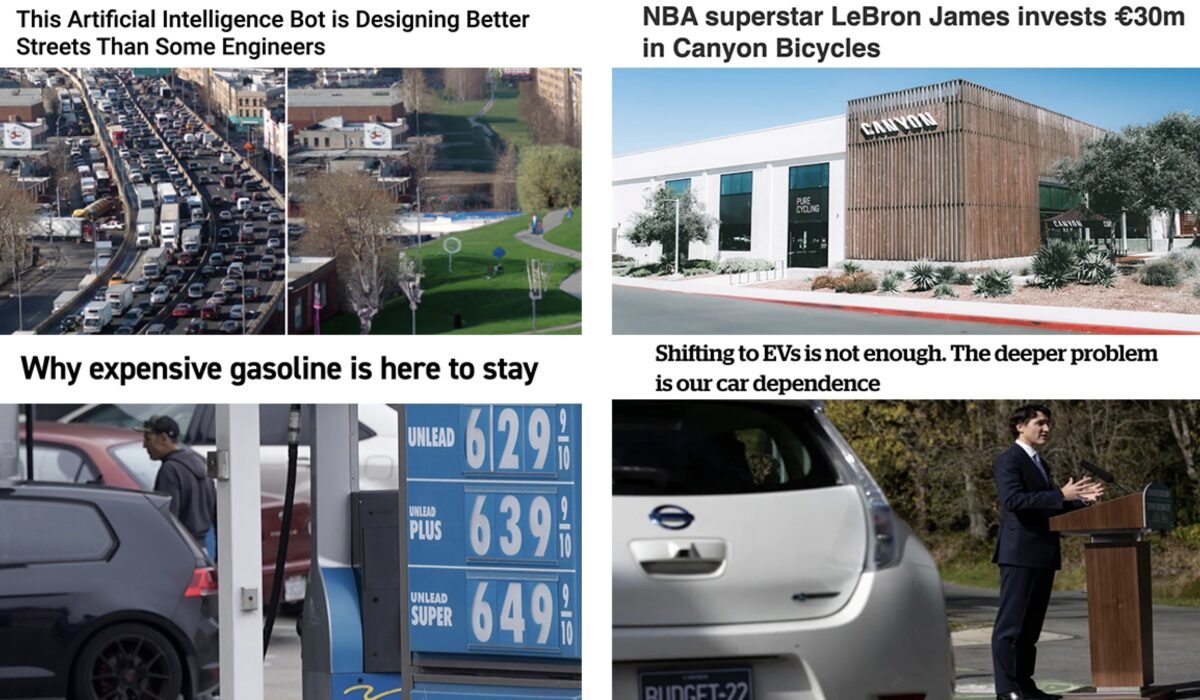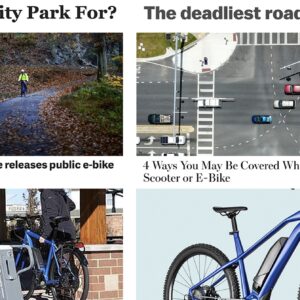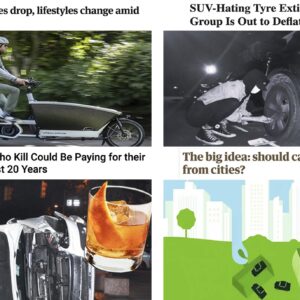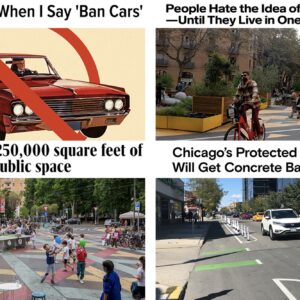Welcome to the first day of August and the start of another wonderful week here on BikePortland. We have lots of fun stuff to share, so let’s kick things off with a roundup of the most notable items our writers and readers came across in the past seven days…
Bikesketball: NBA star and cultural icon LeBron James has put his money where his passion is with a $30 million investment in Canyon Bicycles.
Zach is back: Zach Katz, the former Portlander behind Healthier Hawthorne, is back in the news for launching a viral Twitter account (@betterstreetsai) where he posts jaw-dropping street transformations created with an AI tool.
DOTs gonna’ DOT: Activists in Texas are raising the red flag on their DOTs freeway expansion projects, which are somehow almost always found to have “no significant impact” on the surrounding community and can therefore skirt thorough environmental analysis.
E-bikes left out: The “Inflation Reduction Act” that stormed through Capitol Hill last week includes massive subsidies for e-cars but nothing for e-bikes.
Why the above is bad: In an opinion piece for the CBC, author Paris Marx lays out the case about why too much focus on e-cars is a bad policy choice that won’t solve the problems many governments want us to believe it will.
Car as weapon: A Mississippi man shared a video to social media that showed him intentionally driving his car into a group of teenagers and saying vile things like earning points for hitting them and calling them a racial slur.
Great news: Politico details why gas prices are likely to remain high in the future as society transitions away from internal combustion engines, oil companies struggle to meet demand, the vehicle fleet transitions to e-cars, and investors bet to renewables.
The hill they’ve climbed: NY Times has an excellent piece on the history behind the Tour de France Femmes, the women who laid the groundwork for the recent event, and the ongoing push for equality in women’s professional bike racing.
Follow the money: Joe Cortright’s latest in City Observatory points out the doublespeak from Oregon Department of Transportation when they frame a dire need for money for maintenance and operations, yet continue to spend that money on new roads and freeways.
Better bike routing: Google Maps has announced an update to their biking directions which includes details about what type of road conditions to expect, whether or not you’ll encounter steep hills, and so on.
Thanks to everyone who sent in links this week!








Thanks for reading.
BikePortland has served this community with independent community journalism since 2005. We rely on subscriptions from readers like you to survive. Your financial support is vital in keeping this valuable resource alive and well.
Please subscribe today to strengthen and expand our work.
It’s very frustrating that e-bikes are not going to get tax credits like automobiles. Why not just give all houses up to a $8k tax credit and they can use it on e-bikes, better home insulation, heat pumps, solar, bus passes, etc…I’d love to use $8K on a heat pump instead of using my high polluting wood stove.
You don’t happen to live in Washington County, do you? I believe they have a program for helping you replace your wood stove with electric.
The new bill is supposed to include credits for things like heat pumps. Still needs to pass the Senate, though.
Sure, switching to electric cars alone won’t save us. No thoughtful person disagrees. But even if everybody in the world only rode ebikes, we’re still doomed without population control.
Glad to see better biking features for Google Maps. Currently, I view Google Maps suggested routes as just that – mere suggestions. I almost can improve on their suggestions (as to safety and/or ETA’s) by deviating from their prescribed routes, sometimes before the ride, and sometimes during the ride, as when I find an adjacent side street going in the same direction with less trafric.
Paris Marx, like most before him, resents the fact that the automobile allows us to live in a way he disapproves of.
That story of AI generated streets really illustrates the fantasy world the anti-car activists occupy. They think they can just wish away all the people who depend on those roads to get to the places they need to go. Reality is not like that at all, as anyone whose lived through construction related road closures can corroborate
E-bikes are not our climate saviour. They’re expensive useless hunks of metal when the battery and/or controller expires & people don’t want to pay hundreds of $ to repair/replace.
An e-bike’s service lifetime is on the order of years as opposed to decades for a non-E-bike.
I suspect most people who buy an E-bike don’t actually need one, they just want to go fast w. the least amount of effort/work.
If we actually want to do something about catastrophic climate change, we need to consume less, use less resources, produce less. live slower & simpler.
There are enough bikes in Portland for anyone who wants one.
The problem is us, we’re addicted to the idea we can go to a 100 places & do a 1000 things in 1 day. I see it every day, people rushing around frantically, not present, but stuck in their head, thinking about all the BS of their modern “civilized” life.
Just stop w. all this high-tech electric vehicle hype marketing and walk, bike & use public transit. Invest in your own physical & mental health & our public transit system.
Every time someone throws out the question of “Well, how do I get my kids to school/practice/myself to the gym/etc, with all these things being on opposite ends of town, without my car?!”, my first thought is always: “Uh, don’t do all that?” It’s never a compelling retort, but it gets to my agreement with your point: We consume waaaay too much, and indeed judge our standard/quality of living on that consumption, which is just all wrong.
Not to harp too much on the individual; this is the system we’re all sold. Not accidentally, given how much money there is to be made for our overconsumptive lifestyle.
In full agreement with your broader critique, in other words.
E-bikes aren’t bike replacements, they are car replacements, and there is little reason to believe that the life of an ebike will be shorter than an ICE vehicle, and if folks do end up buying some extra batteries along the way it is far cheaper than the maintenance costs of an ice vehicle.
We’ve had motorcycles for as long as we’ve had cars. They’re incredibly dangerous, they’re uncomfortable, and they’re impractical.
In other words, they’re almost the same as cars, except those attributes apply to one additional person for motorcycles (everyone else + the driver for motorcycles, instead of just everyone else for cars).
Some people do choose to ride motorbikes dangerously, but the biggest danger is the same one bicycles face, motorists who “just didn’t see them”. As far as comfort, there are many riding/seat styles available and it’s not hard to change out the handlebars if you need to. My old Rockhopper was way more uncomfortable than any motorbike I’ve ever ridden. But why impractical? My little recycled, reused, 100 mpg Honda got me to work & back year round (except on icy days), used 1 gallon of gas every 2-3 weeks, and let me keep the $1200 a year that I was giving to Trimet, which added up to more than 14 grand over the years before I switched to an ebike. Plus I didn’t have to waste all that time waiting around at the bus stop.
MC, you are half right…it all depends on the e-bike being chosen as to what trips it will replace: car or bike or x. As to the battery issue, you are absolutely correct…the OEM manufacturer and aftermarket battery market needs either legislation for battery swapability (ie. EU adoption of USB-C cord) or a well financed eco-business to make common adapters using ubiquitous off the shelf power tool batteries. (These batteries could then also be used for at home chores between rides.) https://www.electricbike.com/cordless-tool-batteries-for-ebike/
Jonathan FYI: your headline about the investment has a typo…it is using the Euro vs $ symbol. 😉
A few days ago the dollar was actually worth more than the Euro, but only briefly, for a day or two. It’s possible the investment actually was $30 Million and not 30 million Euros at the time the investment was actually transacted.
RE: LeBron
Just spitballing here but I’m wondering how much of LeBron’s “donation” to the cycling community comes from his millions of $ received from China where he hypocritically remains silent on climate change or human rights abuses. Virtue signaling at home while staying silent when your $$$ income is threatened are trademarks for LeBron.
Any update on Zack Katz’s donations that he took in to sue the city to force the city to make Hawthorne safer for people riding and walking?